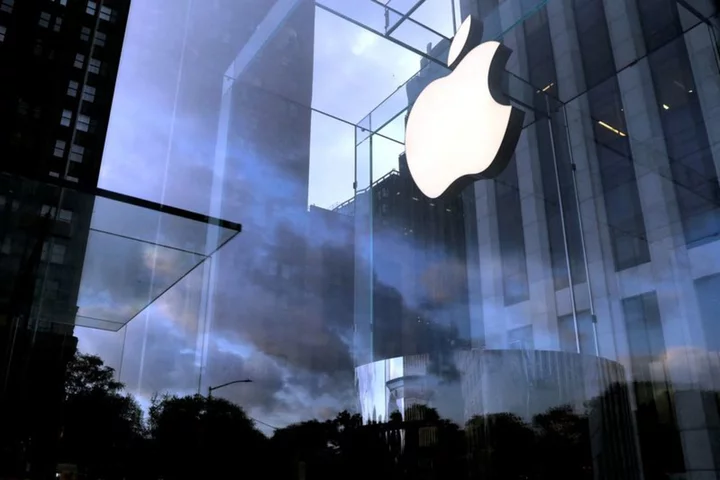
Meta’s Threads Hasn’t Appeared in EU App Stores Ahead of Launch
Meta Platforms Inc.’s Threads app — the social network launching this week to take on Twitter Inc. —
2023-07-05 08:20

Cyber insurance rates drop 10% in June -report
LONDON Cyber insurance rates dropped around 10% in June compared with a year earlier, reversing recent sharp rate
2023-07-05 08:19

Federal judge blocks Biden administration officials from communicating with social media companies
A federal judge on Tuesday ordered some Biden administration agencies and top officials not to communicate with social media companies about certain content, handing a win to GOP states in a lawsuit accusing the government of going too far in its effort to combat Covid-19 disinformation.
2023-07-05 04:22

Twitter Says Ads Mostly Unaffected by Limits That Target Bots
Twitter said its temporary cap on the number of tweets that accounts can see each day has had
2023-07-05 02:48

How to delete your Twitter account
Many of Twitter’s users are looking to move on in the wake of the site’s latest chaos. In recent days, Elon Musk has announced that his site will apply “rate limits” in an attempt to stop data scraping on the site, by automated tools including those used to train AI systems. But in effect that has meant that Twitter has stopped working properly for many of the people who rely on it. After the latest backlash, some of those users are looking to leave the site entirely, and move instead to other alternatives. As they do, they might wish to delete their account to avoid leaving data and posts up online after they leave. But deleting Twitter is not as easy as you might think. The first step is for a user to deactivate their Twitter account, which starts a process during which the user can decide if they actually want to go through with it. When a user deactivates their Twitter account it is no longer visible on Twitter, but if a log-in is carried out during a specified reactivation period then the account remains useable. Once the reactivation period is over then another Twitter user will be able to utilise the username. Before deleting Twitter account the user can download a copy of their information by going to Your account and selecting Download an archive of your data. Deleting Twitter on iPhone or mobile web. 1. Open Twitter app or go to Twitter.com. 2. Tap profile picture. 3. Choose Settings and privacy and select Your account. 4. Chose Deactivate your account 5. Choose reactivation period - 30 days or 12 months. 6. Read disclaimer and select Deactivate 7. Enter password and follow prompts to delete account. Deleting Twitter account on web 1. Open Twitter.com 2. Click on three dot icon on left 3. Choose Settings and privacy and select Your account 4. Choose reactivation period - 30 days or 12 months 5. Read disclaimer and select Deactivate 6. Enter password and follow prompts to delete acount Read More How to delete your Twitter account What does Twitter’s rate-limiting restriction mean? ‘Rate limits’ and Twitter chaos: What exactly is Elon Musk doing? Twitter to stop TweetDeck access for unverified users Meta’s Twitter alternative Threads to be launched this week How Elon Musk finally broke Twitter – and why it might just be the start
2023-07-05 00:25

Time ran five times slower in the early universe, new study finds
New findings have revealed that time ran five times slower in the early universe, after scientists published new research into quasars. A quasar is a luminous active galactic nucleus and studying them has allowed scientists to measure time. The variation in brightness of quasars from the early universe has been measured to determine time dilation back to a billion years after the Big Bang. Experts have found that there was an era in which clocks moved five times slower than they do in the present day. The findings come as a relief to many cosmologists who have been perplexed by previous results that have come from studying quasars. The discovery that the universe is expanding led to the theorisation of “time dilation” – the idea that time moved slower the smaller the universe was. Sign up to our free Indy100 weekly newsletter Professor Geraint Lewis of the University of Sydney, the lead author of a new study, said in a statement: “Looking back to a time when the universe was just over a billion years old, we see time appearing to flow five times slower.” He continued, explaining: “If you were there, in this infant universe, one second would seem like one second – but from our position, more than 12 billion years into the future, that early time appears to drag.” To measure the extent of time dilation, scientists turned to quasars, as they are able to measure their change in brightness over a period they can estimate. The most distant quasar that is visible is 13 billion back in time and can still be seen despite its far distance. Their brightness varies due to turbulence and lumpiness in their accretion disks. Lewis explained the phenomenon as being “a bit like the stock market”. He said: “Over the last couple of decades, we’ve seen there is a statistical pattern to the variation, with timescales related to how bright a quasar is and the wavelength of its light.” Have your say in our news democracy. Click the upvote icon at the top of the page to help raise this article through the indy100 rankings.
2023-07-04 23:59

‘Rate limits’ and Twitter chaos: What exactly is Elon Musk doing?
Twitter has been plunged into chaos in recent days, amid new “rate limits” and rules that actually stop people from using the site. The changes have been dramatic enough that they have led to speculation that they could be the thing to finally doom Elon Musk’s takeover of the social network. What are the ‘rate limits’? It is a somewhat technical term for a complex process that has a simple effect: users are rationed on how many tweets they can see. If people and the apps they use make too many requests too often – in this case for tweets – then the service will stop providing them. On Twitter, the new rate limits are different depending on what kind of user is on: someone who pays for the premium “Twitter Blue” service will get more than a normal user, for instance. They are also changing all the time, with the limit being increased recently. Twitter has long had rate limits, which ensure that malicious actors cannot send huge number of requests to the site and bring it down, for instance. But they would previously only have been hit by people using specific tools, since they were much higher. What happens when you hit the limit? Users will see a warning telling them they have received the rate limit. The site will then stop working properly, because it will refuse to load any more tweets. Why has it happened? The official explanation is that Elon Musk is concerned about how many artificial intelligence companies are scraping posts from Twitter in order to feed to their systems and teach them more about how to use language. In an attempt to stop that, Mr Musk placed the limits to make it harder for that scraping to happen. But there is no proof that is actually the case. The problems at Twitter may well be infrastructural issues caused by the site’s engineering, and its lack of staff, that have made it incapable of serving normal requests. Or it might be a mix of the two. There is no doubt that the site is being scraped, but rate limits of this kind are an unusual way of responding to it, and other sites that are being scraped have not needed to do the same thing. Are there other changes? The other major change instituted recently by Elon Musk is to ban people who are not signed into the site from seeing posts. This is ostensibly for the same reason, since it means that scrapers cannot just gather up posts from the site from the outside. It already means that some things about Twitter are not working as they used to. If someone sends a tweet within a messaging app, for instance, then the posts’ preview won’t show, since the app cannot access the tweet. Will this change how people use Twitter? Almost certainly. Much of Twitter’s value lies in its high-profile and high-commitment users: the celebrities, organisations and big brands who use it to post, and the engaged users who follow them. That is much of what sustains its place in culture, even as it gets fewer users than much bigger social networks such as Facebook. The recent changes have directly antagonised those users. Big organisations cannot rely on tweets as a way for anyone to see what they’re posting, since users have to be logged in; engaged users cannot rely on being able to use the platform, since they are set to be rate limited. What’s more, the recent changes could cause problems for advertisers, given how important it is for users to stay engaged and see their posts. Companies are already using Twitter less for advertising, as a result of other controversies, and that may just continue. Is this the end? Some people have been predicting an end to Twitter since long before Elon Musk took it over; when he did, those predictions got louder and more regular, but they have still been largely wrong. It appears that no matter what Mr Musk does, people keep logging on and using the site. That might well be largely due to network effects: the idea that the value really comes from the number of people using the platform, which also makes it very difficult to create a new one. People might be unhappy on Twitter, but the network effect means they might feel lonely or that they are missing out if they move elsewhere. But all of that doesn’t mean that this time around won’t be the end. Certainly the latest problems have the most obviously problematic effect, of forcing Twitter’s most engaged users to not use the app, which might finally encourage them to go elsewhere. In the end, the discussion is often based on the idea that there will be some big moment that causes everyone to leave Twitter, or for the app to die. In fact, social networks have tended to decline slowly before they are finally shut down; something that might already be happening on Twitter. What are the alternatives to Twitter? Again, people have been trying to replace Twitter for years, for reasons including everything from protests against its content management rules to opposition to its centralised nature. Attempts to create a new Twitter have only increased since Elon Musk took over the original one. But they have almost always failed to take off. Network effects and the relative maturity of Twitter as a platform mean that they have always faced a challenge, and never really met it. As such there are a number of alternatives to Twitter. Notable among them are Mastodon, which is decentralised and has become perhaps the most discussed new alternative, and Bluesky, an effort to build a new kind of Twitter that originally began with the company. But the most promising alternative might be about to launch. Meta is launching Threads this week, an app linked to Instagram that aims to allow people to post text updates that might have the might to actually take over from Twitter. What is happening to TweetDeck? TweetDeck also went down along with Twitter over the weekend. It’s unclear how the two are connected, though they happened at the same time. Now Twitter has announced that TweetDeck is coming back. But it comes with some changes, and the most notable of them is that people will have to pay for Twitter Blue to get access to it. Read More Twitter to stop TweetDeck access for unverified users Meta’s Twitter alternative Threads to be launched this week How Elon Musk finally broke Twitter – and why it might just be the start Twitter rival Bluesky halts sign-ups after huge surge in demand Twitter is breaking more and more Twitter rival sees huge increase in users as Elon Musk ‘destroys his site’
2023-07-04 23:20

Scientists discover secret planet hiding in our solar system
There are eight planets in our solar system – plus poor old Pluto, which was demoted in 2006 – but what if there were more? Turns out that might be the case. Astronomers have calculated there is a 7 per cent chance that Earth has another neighbour hiding in the Oort cloud, a spherical region of ice chunks and rocks that is tens of thousands of times farther from the sun than we are. “It’s completely plausible for our solar system to have captured such an Oort cloud planet,” said Nathan Kaib, a co-author on the work and an astronomer at the Planetary Science Institute. Sign up to our free Indy100 weekly newsletter Hidden worlds like this are “a class of planets that should definitely exist but have received relatively little attention” until now, he said.. If a planet is hiding in the Oort cloud, it’s almost certainly an ice giant. Large planets like Jupiter and Saturn are generally born as twins. They have huge gravitational pulls of their own, however, and sometimes destabilise one another. That could have led to a planet to be nudged out of the solar system entirely – or exiled to its outer reaches, where the Oort cloud resides. “The survivor planets have eccentric orbits, which are like the scars from their violent pasts,” said lead author Sean Raymond, researcher at the University of Bordeaux’s Astrophysics Laboratory. That means that the Oort cloud planet could have a significantly elongated orbit, unlike the near-perfect circle Earth tracks around the sun. Trouble is, when things are that far away, they’re pretty difficult to spot. “It would be extremely hard to detect,” added Raymond. “If a Neptune-sized planet existed in our own Oort cloud, there’s a good chance that we wouldn’t have found it yet,” said Malena Rice, an astronomer at MIT not involved in this work. “Amazingly, it can sometimes be easier to spot planets hundreds of light-years away than those right in our own backyard.” Time to crack out the telescope. Have your say in our news democracy. Click the upvote icon at the top of the page to help raise this article through the indy100 rankings.
2023-07-04 23:15

AI takes just five hours to design functional computer
Researchers in China have developed an artificial intelligence tool capable of designing a working computer in under five hours. The team of 19 computer scientists from five different institutions made the AI breakthrough after setting out to prove that machines can create computer chips in a similar way to humans. The feat was performed 1,000 times faster than a human team could have achieved it, the researchers claimed, marking a major step towards building self-evolving machines. “Design activity... distinguishes humanity from other animals and traditional machines, and endowing machines with design abilities at the human level or beyond has been a long-term pursuit,” the scientists wrote in a paper detailing their research. “We present a new AI approach to automatically design a central processing unit (CPU), the brain of a computer, and one of the world’s most intricate devices humanity has ever designed.” The project involved the layout of an industrial-scale RISC-V CPU, capable of running the Linux operating system and achieving an accuracy of 99.99 per cent in validation tests. The AI bypassed the manual programming and verification process of the typical design cycle, which the researchers said “consumes more than 60-80 per cent of the design time and resources” of human teams. The AI was also able to autonomously make discoveries involving computer design, uncovering something called the von Neumann architecture, first invented in 1945. The overall performance of the CPU is relatively modest compared to modern computers, with the researchers saying it can perform at a similar level to a 1991 Intel 80486SX CPU. Developing the AI approach, however, has the potential to “reform the semiconductor industry by significantly reducing the design cycle”, the researchers said. The research is detailed in a study, titled ‘Pushing the limits of machine design: Automated CPU design with AI’. Leading AI chip maker Nvidia has previously used artificial intelligence to optimise its computer chip designs, publishing a new approach to AI-powered chip design in March that could significantly improve the cost and performance of CPUs. Read More 10 ways AI will change the world – from curing cancer to wiping out humanity Harvard’s new computer science teacher is a chatbot Google’s DeepMind unveils AI robot that can teach itself unsupervised Robots can now learn new skills like picking up knives by watching YouTube videos
2023-07-04 22:23

Scientists discover that megaladon's went extinct because of themselves
Scientists believe they have discovered the cause of the megalodon's extinction – and no, it’s not Jason Statham. Experts have been conducting research on fossils of teeth from the biggest species of shark the world has ever seen, which went extinct around 3.6 million years ago and measured at least 15 metres long. Research published in the journal Proceedings of the National Academy of Sciences explains that the animal was actually partially warm-blooded. Unlike most cold-blood sharks, the body temperature is thought to have been around 27 degrees. The temperature is higher than the sea temperatures around the time. Sign up to our free Indy100 weekly newsletter Study co author Robert Eagle, who is professor of marine science and geobiology at UCLA, said [via CNN]: “We found that O. megalodon had body temperatures significantly elevated compared to other sharks, consistent with it having a degree of internal heat production as modern warm-blooded (endothermic) animals do.” They were able to prove that the animals were warm-blooded by analysing how carbon-13 and oxygen-18 isotopes were closely bonded together in the fossilised teeth. Senior study author Kenshu Shimada is a paleobiologist at DePaul University in Chicago, who said: “A large body promotes efficiency in prey capture with wider spatial coverage, but it requires a lot of energy to maintain. “We know that Megalodon had gigantic cutting teeth used for feeding on marine mammals, such as cetaceans and pinnipeds, based on the fossil record. The new study is consistent with the idea that the evolution of warm-bloodedness was a gateway for the gigantism in Megalodon to keep up with the high metabolic demand.” The fact it was warm-blooded means that regulating body temperature could have been the cause of its eventual demise. The Earth was cooling when the animal went extinct, which could have been a critical factor. “The fact that Megalodon disappeared suggests the likely vulnerability of being warm-blooded because warm-bloodedness requires constant food intake to sustain high metabolism,” Shimada said. “Possibly, there was a shift in the marine ecosystem due to the climatic cooling,” causing the sea level to drop, altering the habitats of the populations of the types of food megalodon fed on such as marine mammals and leading to its extinction. “One of the big implications for this work is that it highlights the vulnerability of large apex predators, such the modern great white shark, to climate change given similarities in their biology with megalodon,” said lead study author Michael Griffiths, professor of environmental science, geochemist and paleoclimatologist at William Paterson University. Have your say in our news democracy. Click the upvote icon at the top of the page to help raise this article through the indy100 rankings.
2023-07-04 21:54

Apple loses London appeal in 4G patent dispute with Optis
LONDON Apple Inc infringed two telecommunications patents used in devices including iPhones and iPads, London's Court of Appeal
2023-07-04 21:45

AI is already linked to layoffs in a surprising industry
Many have raised alarms about the potential for artificial intelligence to displace jobs in the years ahead, but it's already causing upheaval in one surprising industry where workers once seemed invincible: tech.
2023-07-04 20:50
